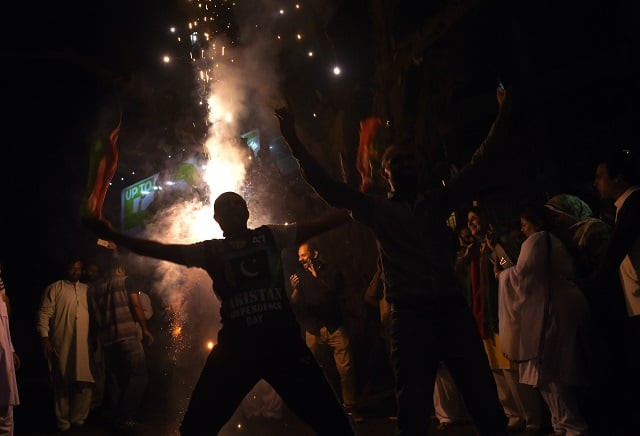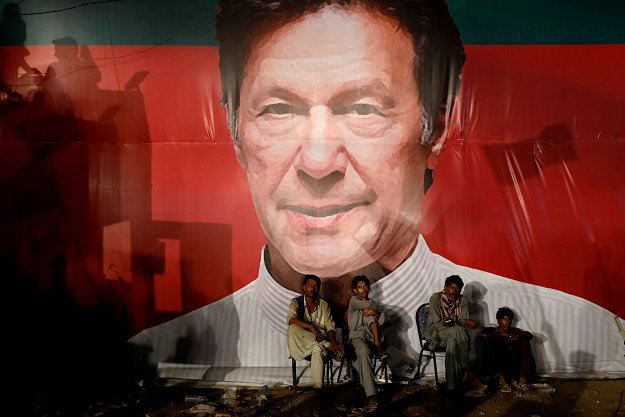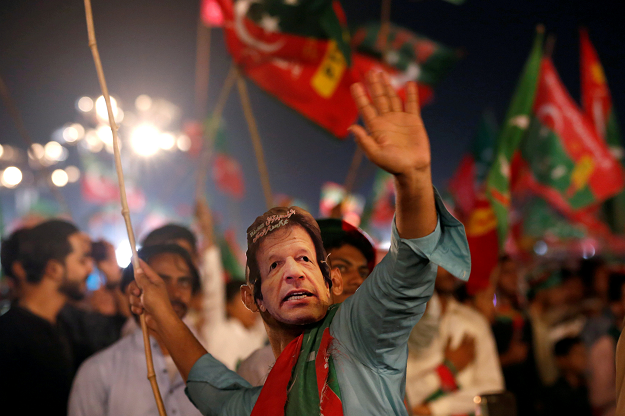Hopes sky high with Imran-led new government
In his victory speech, Imran offered an olive branch to India and called for mutually beneficial ties with US

Supporters of Pakistan's cricketer-turned politician and head of the Pakistan Tehreek-e-Insaf (Movement for Justice) Imran Khan, celebrate after Khan takes oath as a Prime Minister, in Lahore on August 18, 2018. PHOTO: AFP
A cricket legend who is hero-worshipped by supporters, Imran swept to power in last month’s elections on a populist platform vowing to root out corruption among a venal elite and lift people out of poverty.
But the Pakistan Tehreek-e-Insaf (PTI) chairman inherits a nation facing mounting problems at home and abroad, including a looming economic crisis and a fracture with historic ally the United States. Ties are also fraught with neighbours Afghanistan and nuclear-armed rival India.
US looks forward to working with Imran-led govt: State Dept
In his victory speech, Imran had offered an olive branch to India and called for mutually beneficial ties with the US.
Forced to rely on smaller parties for a razor-thin majority in parliament, and with the opposition controlling the Senate, the newly-elected PM’s coalition government could struggle to push through legislation without major compromises.
Yet the mood in the country is one of unbridled optimism, especially among Imran’s young supporters, who believe he can build a corruption-free and prosperous Naya Pakistan for the country’s 208 million people.
Imran becomes PM, vows ruthless accountability
During Independence Day celebrations this week, when flag-waving Pakistanis flooded the streets of Islamabad, many voiced confidence that Imran would deliver on promises to build world class hospitals and improve education in a nation where the illiteracy rate hovers above 40 per cent.
 Labourers sit under a wall with a billboard displaying a photo of Imran Khan. PHOTO:REUTERS
Labourers sit under a wall with a billboard displaying a photo of Imran Khan. PHOTO:REUTERS“I have moved my daughter (from a private) to a government school, because we are confident that Pakistan is going to change,” said Sheikh Farhaj, 40, who volunteered for the ruling party during the elections.
Others were delighted that Imran has broken the decades-long dominance of the two dynastic powerhouses, the Pakistan Muslim League-Nawaz (PML-N) party of jailed former premier Nawaz Sharif and the Pakistan Peoples Party (PPP) of the Bhutto family.
“We have great expectations from Imran Khan,” said Shah Sultan, 38, a roadside flag seller. “We are lower class people and I voted from Imran because what the politicians have done to our country. They have left it with nothing.”
Challenges facing PM Imran Khan
But Imran’s poll campaign pledges are likely to be checked by a worsening economic outlook, analysts say, especially his vow to build a welfare state.
The central bank has devalued the rupee four times since December, but the current account deficit is still carrying the currency toward a crisis, while the fiscal deficit has ballooned to 6.8 per cent of GDP.
Economic growth is running at nearly 6 per cent, but given the unsustainability of these deficits it is easy to predict Pakistan’s growth is heading for a fall.

A supporter of Imran Khan wears a mask and dance on party songs during a campaign rally. PHOTO:REUTERS
Imran’s government must urgently decide whether to request more loans from China, deepening Islamabad’s economic reliance on its neighbor, or ask the International Monetary Fund (IMF) for what would be its 15th bailout since 1980.
Both lenders are likely to ask for more fiscal discipline, requiring drastic spending cuts.
Shafqat Mahmood, Khan’s new education minister, said the economic woes pose a major problem but the party is determined to deliver a welfare system and enact badly-needed reforms.
Imran has touted his “100 Day Plan” but many of the reforms PTI is proposing, from turning around loss-making state-run enterprises to reforming the tax collection bureau, will take far longer to accomplish.



















COMMENTS
Comments are moderated and generally will be posted if they are on-topic and not abusive.
For more information, please see our Comments FAQ